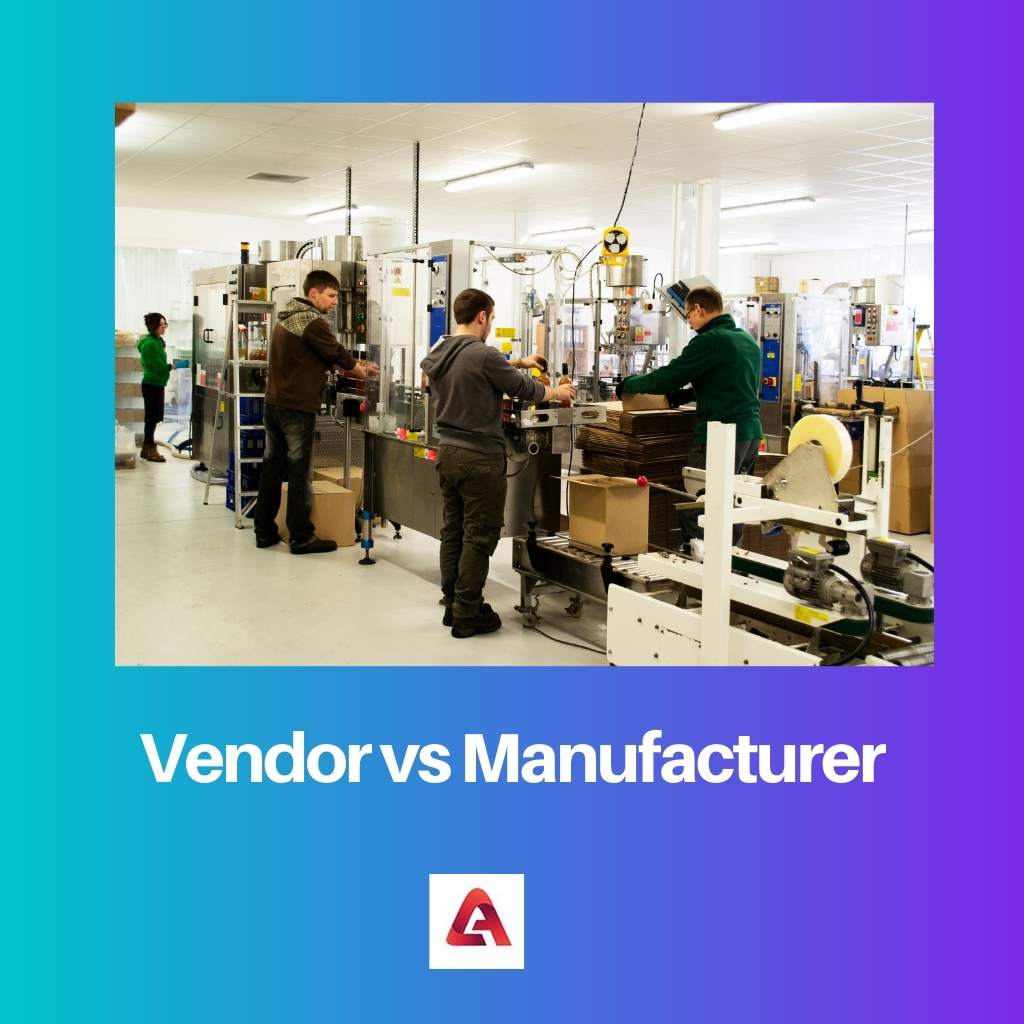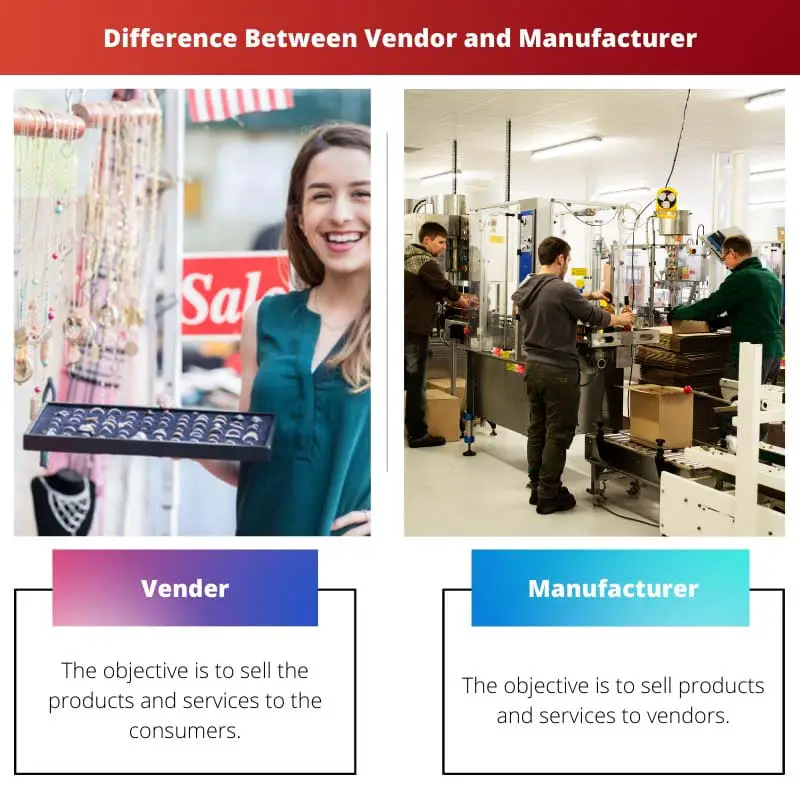A vendor is a seller or supplier of products, often operating at the retail level, while a manufacturer is involved in the production of goods, designing and creating the products. Vendors typically purchase goods from manufacturers and sell them to end consumers, acting as intermediaries in the supply chain. Manufacturers, on the other hand, focus on the production process, ensuring the quality and quantity of goods for distribution through various channels, including vendors.
Key Takeaways
- A vendor is a person or company that sells goods or services to customers, while a manufacturer is a company that makes products to be sold by vendors.
- Vendors do not produce their own goods but instead purchase them from manufacturers to sell them to customers, while manufacturers are responsible for creating and producing goods.
- Vendors focus more on marketing and selling products, while manufacturers prioritize the production process and ensuring product quality.
Vendor vs Manufacturer
A vendor can be a company or any particular person who sells different products and services in the market. Vendors purchase products from manufacturers. Manufacturers can be the employees who are responsible for producing goods and services for the market. They focus on the production process.

A vendor is a person who is involved in the process of purchase and distribution of goods and services to the consumers. He acts as an intermediary between the manufacturer and the consumer.
A manufacturer is a person who is involved in the process of converting raw materials into finished goods and services. He may sell his products directly to the consumers or indirectly through vendors.
Comparison Table
| Feature | Vendor | Manufacturer |
|---|---|---|
| Role | Supplies products to end users | Creates finished products from raw materials |
| Function | Distribution and procurement | Production |
| Relationship with product | Sells existing products | Designs and creates new products |
| Customer focus | Focuses on fulfilling customer needs and preferences | Focuses on efficient production and product quality |
| Risk | Lower risk, responds to existing demand | Higher risk, needs to forecast demand and manage inventory |
| Examples | Wholesaler, retailer, online marketplace | Automobile company, clothing manufacturer, electronics producer |
What is Vendor?
A vendor is a term commonly used in business to refer to an individual or a company that sells goods or services to another entity. Vendors play a crucial role in the supply chain and business operations, acting as the source of products or services that organizations need to carry out their activities.
Types of Vendors
Product Vendors
Product vendors specialize in the sale of physical goods. They can range from manufacturers and wholesalers to retailers. These vendors provide tangible items such as raw materials, finished products, or components necessary for various industries.
Service Vendors
Service vendors, on the other hand, focus on delivering intangible services. This category includes consultants, IT service providers, marketing agencies, and other entities offering expertise or assistance to businesses.
Software Vendors
Software vendors specialize in creating, selling, and maintaining software applications. They play a vital role in the technology industry, providing solutions for diverse needs such as enterprise resource planning (ERP), customer relationship management (CRM), and more.
Vendor Relationships
B2B (Business-to-Business) Vendors
In B2B relationships, vendors sell their products or services to other businesses. This could involve large-scale transactions, long-term contracts, and negotiations tailored to meet the specific needs of the purchasing organization.
B2C (Business-to-Consumer) Vendors
B2C vendors directly sell goods or services to individual consumers. These transactions are often characterized by a higher volume of smaller-scale sales and a focus on marketing and customer experience.
Vendor Networks
In complex supply chains, vendors often form networks to collaborate and ensure a seamless flow of goods and services. This may involve multiple tiers of suppliers, manufacturers, and distributors working together to meet the demands of the end consumer.
Vendor Management
Vendor Selection
Selecting the right vendors is a critical aspect of effective vendor management. Organizations consider factors such as product quality, reliability, pricing, and reputation when choosing vendors for their supply chain.
Contract Negotiation
Negotiating contracts with vendors involves defining terms, conditions, and expectations. This includes pricing structures, delivery schedules, quality standards, and other crucial elements that impact the business relationship.
Performance Monitoring
Once engaged, organizations monitor vendor performance to ensure that agreed-upon terms are met. This may involve assessing delivery times, product quality, and adherence to contractual obligations.
Challenges in Vendor Management
Vendors are exposed to various risks, such as natural disasters, economic fluctuations, or geopolitical issues. These risks can disrupt the supply chain and impact the availability of goods and services.
Vendors are exposed to various risks, such as natural disasters, economic fluctuations, or geopolitical issues. These risks can disrupt the supply chain and impact the availability of goods and services.
Quality Control
Maintaining consistent product or service quality across different vendors can be challenging. Organizations need robust quality control measures to ensure that the standards are met throughout the supply chain.
Communication and Collaboration
Effective communication and collaboration are crucial for successful vendor management. Misunderstandings or breakdowns in communication can lead to delays, disputes, and overall inefficiencies in the business relationship.

What is Manufacturer?
In the realm of commerce and industry, a manufacturer plays a pivotal role in the production and distribution of goods. This entity is a key player in the supply chain, contributing significantly to economic growth and development. In this detailed exploration, we delve into the multifaceted nature of a manufacturer.
Definition and Core Functions
Definition
A manufacturer is an entity engaged in the transformation of raw materials, components, or parts into finished goods that are suitable for use or sale. This process typically involves various production stages and may include the assembly of components, creation of products from raw materials, and the integration of different elements to produce the final product.
Core Functions
- Production Planning and Scheduling Manufacturers meticulously plan and schedule production activities to optimize efficiency. This includes determining the quantity of goods to be produced, the required resources, and the timeline for each production phase.
- Raw Material Procurement Procuring high-quality raw materials is a critical function for manufacturers. This involves establishing reliable supply chains, negotiating contracts, and ensuring a consistent flow of inputs to sustain production.
- Product Design and Development Manufacturers often engage in product design and development to create innovative and competitive offerings. This may involve research and development activities to enhance product features and meet market demands.
- Quality Control Ensuring the quality of manufactured goods is paramount. Manufacturers implement quality control measures throughout the production process to identify and rectify defects, ensuring that the final products meet established standards.
- Supply Chain Management Manufacturers are integral to supply chain dynamics. They coordinate with suppliers, distributors, and retailers to ensure a seamless flow of goods from production to consumption.
- Logistics and Distribution The logistics and distribution functions involve the efficient movement of finished goods from the manufacturing facility to distribution centers and ultimately to retailers or end consumers.
Types of Manufacturers
1. Original Equipment Manufacturer (OEM)
OEMs produce goods or components that are used in the products of another company. They often specialize in specific components and collaborate with other manufacturers for the assembly of final products.
2. Contract Manufacturer
Contract manufacturers are hired by other companies to produce goods on their behalf. This outsourcing arrangement allows businesses to focus on core competencies while leveraging the manufacturing expertise of a specialized entity.
3. Batch and Job Shop Manufacturers
These manufacturers produce goods in small batches or undertake custom orders based on specific customer requirements. This approach is common in industries where products are highly customized or have low demand.
4. Continuous Process Manufacturers
Continuous process manufacturers engage in continuous production of goods, often using automated systems. Industries such as chemical manufacturing and oil refining commonly employ continuous processes.
Challenges Faced by Manufacturers
Manufacturers encounter various challenges, including:
- Global Competition Intense competition from global players can pose challenges for manufacturers to maintain market share and profitability.
- Supply Chain Disruptions Manufacturers are susceptible to disruptions in the supply chain, such as raw material shortages, transportation issues, or geopolitical events.
- Technological Advancements Keeping pace with rapidly evolving technologies is crucial for manufacturers to remain competitive and efficient.
- Regulatory Compliance Manufacturers must navigate complex regulatory landscapes, ensuring adherence to safety, environmental, and industry-specific regulations.

Main Differences Between Vendor and Manufacturer
- Roles in the Supply Chain:
- Manufacturer: Engages in the actual production or creation of goods.
- Vendor: Typically resells products, often sourced from various manufacturers.
- Ownership of Production:
- Manufacturer: Owns and operates the production facilities, responsible for the entire manufacturing process.
- Vendor: Does not necessarily own the production facilities; instead, focuses on selling and distributing products.
- Product Range:
- Manufacturer: Primarily concerned with producing goods and may sell directly to end-users or distribute through various channels.
- Vendor: Focuses on selling products, often from multiple manufacturers, and may not be involved in the actual production.
- Control Over Quality:
- Manufacturer: Has direct control over the production process, allowing for more oversight of product quality.
- Vendor: Relies on the quality control measures implemented by the manufacturers it sources products from.
- Branding:
- Manufacturer: Often associated with the production and may have their own brand identity.
- Vendor: May or may not have a distinct brand, as they may sell products from different manufacturers under their own label or the manufacturer’s brand.
- Customization and Specifications:
- Manufacturer: Can customize products based on specific requirements and set product specifications.
- Vendor: Typically sells products as they are received from manufacturers and may have limited ability to customize.
- Relationship with End Customers:
- Manufacturer: May sell directly to end-users or through various channels, establishing a direct connection with customers.
- Vendor: Sells products to end-users through retail or wholesale channels, acting as an intermediary between manufacturers and customers.
- Supply Chain Involvement:
- Manufacturer: Involved in the production and supply chain, from raw materials to the finished product.
- Vendor: Focuses on the distribution and sale of products, playing a role further down the supply chain.
- Volume of Operations:
- Manufacturer: Concentrates on large-scale production and may produce in bulk.
- Vendor: Deals with a range of products from different manufacturers, operating on various scales based on the size of their inventory and market reach.




